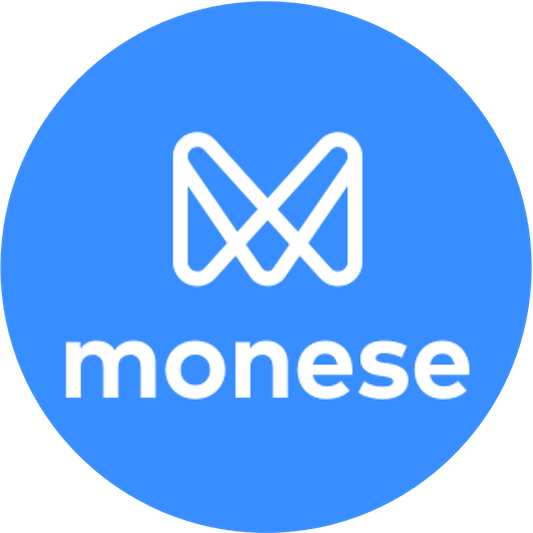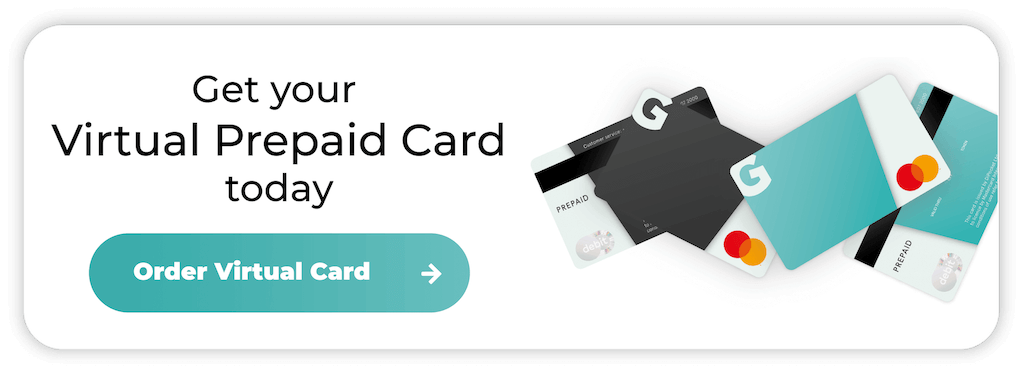
Monese Virtual Card Alternative:
Monese’s virtual card is a handy tool, but it’s not the only banking option available. Digital banking offers convenience, flexibility, and security, with many providers offering virtual cards to customers.
The sheer availability of virtual cards and digital banks makes it challenging to choose the right provider, but we’ve rounded up some excellent Monese alternatives.
Whether you’re looking for rewards, low fees with international spending or cashback, there’s a perfect digital banking provider.
Let’s get straight to it.

An overview of Monese bank accounts
Monese is a digital banking app that offers users a Mastercard debit card and a virtual card. The service allows account holders to manage their finances and make payments online without needing a physical card.
The company offers a variety of plans for users, including a fee option with limited features. Overall, Monese distinguishes itself with the following features:
- Quick Sign-ups: Opening an account is simple, and you can complete the sign-up process within a few minutes.
- No Credit Checks: While most traditional banks require credit checks, Monese doesn’t. People with limited credit histories can open an account without worrying about restrictions.
- Multi-currency Accounts: Manage multiple currencies and spend internationally.
- Security: Making purchases with a virtual card provides additional security. Monese also offers Mastercard 3D Secure, authentication, and single phone access.
- Plans and Pricing: Monese offers a free plan with basic features, but account holders can opt for paid plans, which provide budgeting tools and other incentives.
Why considering Monese alternatives might be beneficial
Despite the many benefits Monese offers, there are some drawbacks associated with the digital-only bank account. Understanding them can help you decide whether to explore other providers.
The downsides of Monese include:
- Fees: The free plan has limitations, including fees on ATM withdrawals, international transactions and charges when users exceed their monthly limits.
- Incentives: Monese focuses more on practicality rather than benefits. If you want cashback, rewards, or other incentives, you might be better off with a different provider.
- Customer Service: Free users don’t receive access to priority customer support. If you experience issues, you might have to wait for Monese to respond.
5 Top Monese Alternatives
The following Monese alternatives offer convenience, accessibility and unique features. Some don’t require your bank account details, while others provide multi-currency account options and offer free cash withdrawals.
Here are five top online banks and virtual card services.
1: Curve
Curve is a financial app that helps users control their spending and combine bank cards into one platform. While most cards are eligible, the app doesn’t support American Express. Plus, it’s compatible with PayPal and a one-stop platform for transactions and money management.
Users can choose between different tiers, including a free Curve profile. Curve offers great incentives, such as cashback from your favourite retailers and airport lounge access if you’re willing to pay a monthly fee.
Pros:
- Convenience: Users can combine their accounts into one curve card, simplifying physical and digital purchases.
- Rewards: Each tier offers different rewards, including lower international transaction fees, lounge access and cashback.
- Flexibility: A key benefit of Curve is its “Go Back in Time” feature. Users can divert transactions onto a different card within set time limits.
- Security: Curve implements strict security measures to protect your personal information and reduce fraud risks.
Cons:
- Not a Bank: The platform lets users integrate their bank accounts into one place, but it doesn’t offer a bank account.
- Monthly Limits: There are limits for foreign transactions, and the Go Back In Time feature.
- Reliance on Cards: You’ll need to connect your bank cards to Curve; each account has limits. For example, the free account only lets you connect three cards.
Is Curve right for your needs?
If you use multiple credit and debit cards, Curve simplifies money management by combining them into one convenient platform. It lets paid users choose rewards and earn cashback with their favourite retailers. The platform has limitations and isn’t a traditional digital bank.
2: Revolut
Revolut is a popular financial app that offers a prepaid debit card. While it’s not a fully licensed bank, Revolut offers a range of features, including multi-currency accounts, international spending, virtual cards and budgeting tools.
The app sets itself apart with competitive exchange rates, enabling you to save money on foreign transaction fees. Users can also open business, joint and savings accounts, earning points for cashback and other incentives.
Pros:
- Affordable: With competitive exchange rates and fee-free international spending, users can save money on foreign transactions.
- Convenience: Combine multiple currencies and financial management tools in one convenient app. The budgeting tools help you track your finances and stay on top of transactions.
- Security: Revolut offers security features, including virtual cards, two-factor authentication and machine learning to identify fraud.
- Flexibility: Choose between different account options, including a business account, savings account, and freelancer options.
Cons:
- Monthly Limits: The free plan has limitations, including ATM withdrawal and foreign transaction fees. Paying gives you access to more features.
- Customer Service Concerns: Revolut’s customer service team has mixed reviews, with some reporting slow wait times.
- Regional Limits: Stock trading is currently only available for UK customers. If you’re interested in using a virtual card to invest in crypto or stocks, another provider might be more accessible.
Is Revolut right for your needs?
Revolut is a fantastic solution for flexible online banking services. Its variety of products makes it more accessible than many traditional banks, with options spanning far beyond the traditional current account. However, there are some fees and restrictions for free users.
3: Getsby
Getsby isn’t a digital bank but a company offering users prepaid virtual cards. While the platform doesn’t have a traditional service, its accessibility and ability to support budgeting make it an excellent option for people who want to enjoy secure spending.
Users can choose a three-year-old Virtual Green Card or a single-load Virtual Black Card for secure spending. The cards link to Google Pay and Apple Pay accounts, allowing contactless transactions.
Pros:
- Privacy: Prepaid virtual cards don’t link to your bank account and use encryption technology to promote security. The cards also come with Mastercard 3D Secure 2.0 and use tokenization to protect your transactions.
- Spending Control: Prepaid cards help you manage your budget, as you preload the cards before spending. They also offer low transaction and foreign exchange fees.
- Convenience: Manage your cards and top-up balances through the Getsby app. Signing up for an account takes minutes, and there are no credit checks.
- Flexibility: Getsby users don’t have to transfer their bank accounts onto the app and can begin using it immediately.
Cons:
- Non-Bank: Getsby offers prepaid virtual cards only, and users can’t open bank accounts. If you want complete banking services, another solution might offer more convenience.
- Spending Limits: The Black Card comes with a €500 balance limit. The Green Card offers higher limits for large purchases. You can also reorder new cards instantly.
- Fees: Getsby charges for ATM withdrawals and foreign transactions, but these amounts are typically lower than most banking providers.
Is Getsby right for your needs?
Getsby surpasses itself in convenience and flexibility. Yes, many digital banks offer virtual debit cards, but Getsby users can access more disposable cards and don’t have to link bank accounts. If you want to make quick transactions without monitoring your bank account, Getsby could be the right choice.
4: Bunq
Bunq is a Dutch digital bank known for its impressive features and focus on user experience. As a licensed bank, it offers a variety of options, combining the convenience of digital and the versatility of traditional banks.
Users have access to different accounts, including subaccounts, which enable money management and organisation. Generating virtual cards keeps your personal information safe when making online transactions.
Pros:
- Innovation: Bunq offers joint accounts, subaccounts and kid’s accounts with some plans. Opening a mobile bank account gives you a wealth of options.
- International Friendly: Manage multiple currencies and benefit from fee-free international payments with some plans.
- Security: Users can generate a virtual card, facilitating secure online payments. All accounts come with biometric IDs, two-factor authentication and rotating CVCs.
- Flexibility: Choose the right plan for your needs. Free users can access virtual cards and connect to Google Pay and Apple Pay.
Cons:
- Fees: Bunq uses a subscription model, and accessing all features requires €18.99 a month. Free users can only connect one account and generate one virtual credit card.
- Extra Charges: If you exceed your allowance for foreign transactions and free ATM withdrawals, you’ll need to pay additional fees.
- Limited Customer Service Reports: Some users report mixed experiences with Bunq’s customer service. Free accounts might mean longer wait times.
Is Bunq right for your needs?
If you’re willing to pay a monthly fee for the premium account, Bunq offers a range of benefits. The free accounts come with limitations, so they might not suit everyone.
5: N26
As a licensed bank, N26 offers account holders a wider range of services than you’d get with a digital-only bank account, including simplified account setups, virtual cards, and the ability to withdraw cash.
As a European-based bank, users can enjoy no or low fees on international payments while spending in the European Economic Area. The free account gives you a virtual and the option to make investments.
Pros:
- Convenience: It’s easy to open an account and use the app to manage your money. For online transactions, free account holders can also connect their Apple Pay and Google Pay accounts.
- Globally Friendly: Paid users can access low or no foreign transaction fees for spending and free ATM withdrawals. However, there are some limits if you travel outside of the Eurozone.
- Security: N26 implements strict security measures, including 3D Secure, two-factor authentication and deposit protection. These security features apply to all accounts.
- Transparency: The platform lists its fees and outlines the rewards associated with each tier, giving users complete clarity.
Cons:
- Limitations: Free users can only access one virtual card and up to three ATM withdrawals. Subscribing to a premium plan gives you more incentives, but they come with higher costs.
- Personal Account Restrictions: Many incentives N26 offers are for business account users. This includes travel insurance and extra budgeting tools.
- Potential Fees: If you exceed your limitations or make transactions outside the Eurozone, you’ll need to pay the excess charges.
Is N26 right for your needs?
N26 is ideal for users who travel regularly and spend money in the Eurozone. If you’re opening a business account, you can access premium features, but current account holders receive fewer rewards and incentives.
Ready to choose your digital banking app?
All of the services we mentioned offer benefits, but they also come with drawbacks. When deciding which solution is best for your needs, remember to think about your priorities and ask yourself the following questions:
Business or personal use?
Bunq is ideal for opening a business account, as many incentives are for corporate users only. If you’re opening a personal account, opting for Revolut or N26 might provide more rewards.
Do you want to link your existing accounts?
If you’d prefer to keep your existing bank accounts, Curve enables you to link accounts into the app. Remember, free users have limits on how many debit and credit cards they can add.
Are convenience and flexibility your top priorities?
Getsby doesn’t require access to your bank details as you preload the card. If you don’t want to go through the complex signing process that most online banks have, opting for prepaid virtual cards enables you to manage direct debits, subscriptions and make payments immediately.
Is coverage under the Financial Services Compensation Scheme important?
The Financial Services Compensation Scheme protects bank account holders but is usually only available with traditional banks. Most virtual cards aren’t eligible unless linked to licensed accounts. Many prepaid card providers offer protection through ring-fencing.
Order your Virtual Cards online
Apply for a digital prepaid card online and receive the activation code via email within 2 minutes.



